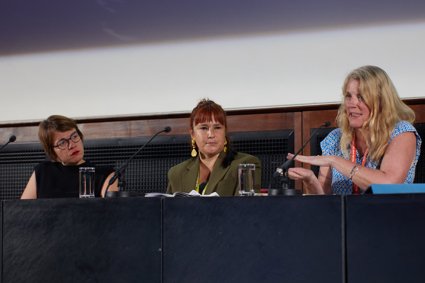
Chair's plenary conversations
We are delighted to announce the following chair's plenary conversations at the conference, convened by Professor Stephen Legg and relating to his chosen theme of Mapping. Please see below for details of the planned sessions. Dates and times will be confirmed asap, along with details of additional speakers and chairs. You can also find out more about other programme highlights at the conference.
Chair's opening plenary conversation: Mapping Geography
To the wider public, maps define what geography is and what it does. Mapping, in turn, allows researchers to communicate beyond the academy. This conversations brings together two very different forms of mapping as a way of exploring ways in which we can engage and create public geographies of understanding, and the ways in which publics can help us make our maps.
Chair: Professor Stephen Legg, Conference Chair (University of Nottingham, UK)
Speakers:
- The Joy of Maps: Professor James Cheshire (University College London, UK)
- Subjective Atlases: Annelys de Vet (Subjective Atlases; Sint Lucas School of Arts and the University of Antwerp)
Chair's plenary conversation: Mapping Abolition
The creation and abolition of the transatlantic slave trade was pivotal to the emergence of colonial modernity. This conversation will explore how we can map the ongoing legacies of slavery, abolition, and the racial configuration of contemporary geographies.
Chair: Professor James Esson, (Queen Mary, University of London, UK)
Speakers:
- Black Geographies: Professor Camilla Hawthorne (UC Santa Cruz, USA);
- British Monuments Related to Slavery: Dr Gavin Grindon (Queen Mary, University of London, UK), Dr Duncan Hay (University College London, UK), and Jennie Williams (University College London, UK)
Chair's plenary conversation: Mapping Counter-Cartographies
Maps are often associated with surveillance, colonialism, and control, but they are also pivotal to practices of evasion, anticolonialism, and resistance. This conversation charts the potential of mapping for holding violence to account and facilitating the creation of alternative geographies.
Chair: Professor Patricia Daley, (University of Oxford, UK)
Speakers:
-
Mapping Plural Urbanisms: Professor Gautam Bhan (Indian Institute for Human Settlements, India);
- Mapping Against Dispossession: Dr Hashem Abushama (University of Oxford)
Chair's plenary conversation: Mapping COVID-19
The COVID-19 pandemic changed the way many of us use and think of maps. Since the emergence from lockdown, geographers have contributed to widespread efforts to map COVID-19 and its impacts. Here we bring into dialogue two forms of mapping the virus and the geographies that it created.
Chair: Professor Matthew Smallman-Raynor (University of Nottingham, UK)
Speakers:
- Geospatial Phylodynamics of SARS-CoV-2: Professor John Hessler (Johns Hopkins University, USA)
- Stayhome Stories: Professor Georgina Endfield (University of Liverpool, UK) and Dr Jacqueline Waldock (University of Liverpool, UK)













